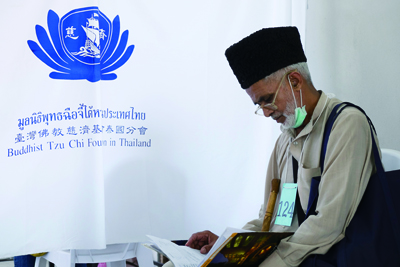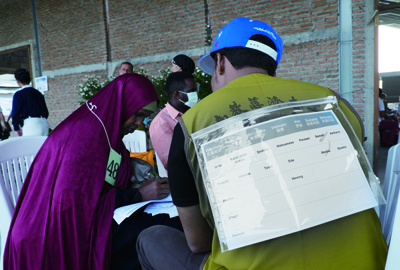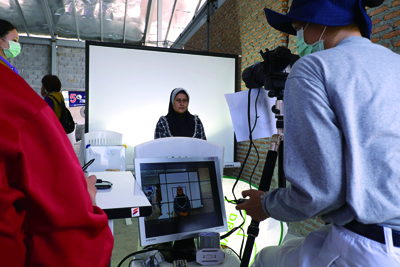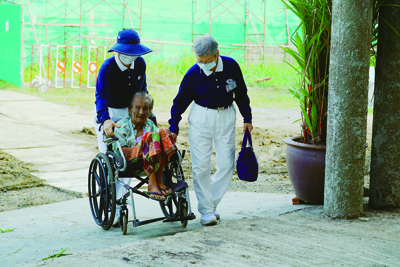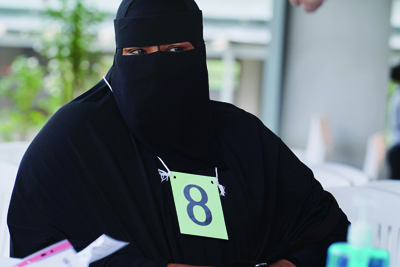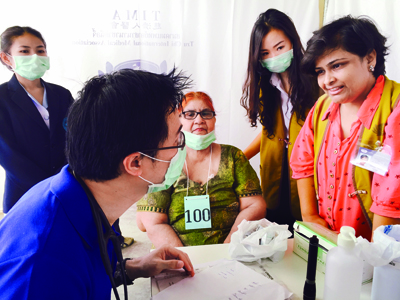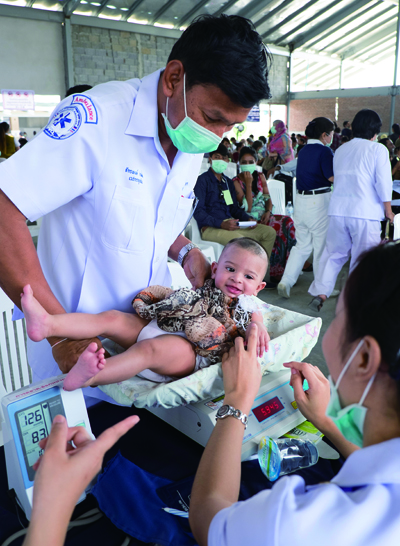

| Medical Care for Refugees in Thailand | ||||||||||||||
| By Qiu Ru-lian Translated by Tang Yau-yang Photos by Hsiao Yiu-hwa | ||||||||||||||
A group of us from Tzu Chi climbed the narrow stairs up a four-story building in a Bangkok suburb. Suddenly, from behind us, someone called out, “Are you with Tzu Chi?” We looked back and saw Suhail Joseph waving to us from an open door. Going past his home without knowing it was an understandable mistake—the building contained many small studio apartments, each with a door of the same color. Suhail led us into his apartment. Saima Khokhar, his younger sister, was setting the table. “Please join us for breakfast,” she said to us. A small balcony, equipped with a personal-sized gas stove, served as their kitchen. Joseph squatted by the flame to make buttered toast and a pot of Pakistani milk tea. Volunteers stepped up to kiss his mother, Theresa Khokhar, 71, who was sitting on a bed. Theresa broke into a smile. As the sizzling toast filled the room with a buttery aroma, Saima began to tell us their story. The family came from Pakistan. Suhail was a makeup artist, while Saima worked at the British Embassy in Pakistan. She had worked at the embassy for ten years when someone reported to the government that she and her family were Catholic. She was warned that her job hinged upon her conversion to Islam. When she refused to convert, she began to be ostracized at work. She was finally fired and even threatened with death. Saima knew that her family had only one way out—to flee to another country. She knew that Thailand was a tourist magnet and that it was easy to obtain a tourist visa to the country, so they decided to go there. When they arrived in Thailand in 2013, they first stayed at a cheap hotel. Their church later helped them find a place to rent, for which they paid four thousand baht (US$110) a month, utilities included. The church priest even gave them furniture and eating utensils. Before they knew it, their two-month visa expired. With help from their church again, the family applied for asylum at the United Nations High Commissioner for Refugees (UNHCR). Saima was fluent in English, so a lawyer from the church got her a job as a translator. She makes between 2,500 and 3,000 baht (US$70-84) a month. That is not much money, but earning it requires a lot of courage. Every time she steps out of her home to go to work, Saima worries about being questioned or detained by the authorities. She is afraid of not being able to see her family again. But she has to push those fears aside to go out to work to help support her family. Even with her income, they barely scrape by. Theresa has a heart condition and diabetes; she goes to a clinic once every two months to see the doctor and get medications, at a cost of about 2,500 to 3,000 baht. In other words, for every two baht that Saima makes, one goes towards her mother’s regular clinic visits. Saima is grateful to the priest for often providing them with food and clothes. Still, she and her family have to live as simply as they can to cut spending.
Free clinics In 2013 the number of refugees registered with the UNHCR in Thailand jumped from less than three thousand to over eight thousand. They are from 47 nations; some of them were smuggled in and some simply chose to overstay their visas. Though they came to the country through different means, they shared a common goal: a free and stable life. However, that seemingly humble aspiration has proved elusive. Thailand was not a signatory of the 1951 Convention Relating to the Status of Refugees and its 1967 Protocol. This means the nation does not grant asylum to refugees. As a result, refugees are illegal in Thailand. This is why Saima is so apprehensive about leaving her apartment for work. The lack of legitimacy has kept refugees largely in hiding, subsisting with the help of charitable organizations. The Bangkok Refugee Center started offering basic medical care to help these people more than two decades ago. However, the center featured only rudimentary equipment, and physicians were not always on duty. Nurses dished out over-the-counter medications to patients for minor conditions, but anything more serious required the services of private clinics elsewhere. In 2014, with the surge of refugees in Thailand, the UNHCR sought to collaborate with charitable organizations to provide better services for refugees while they waited to be granted asylum. The Office of Refugee and Migration Affairs at the U.S. Embassy in Bangkok was aware of the good work that Tzu Chi volunteers had done for refugees in Malaysia through the provision of free medical services. Officials at the embassy got in touch with Tzu Chi volunteers in Thailand and expressed hope that Tzu Chi Thailand could also offer free clinics for local refugees. That led to the eventual signing of a memorandum of understanding to this effect between the U.S. State Department and Tzu Chi in August 2014.
To fulfill this mission, Tzu Chi would first need the help of many medical care providers. Yu Jian-zhong (余建中), director of the Thailand chapter of the Tzu Chi International Medical Association (TIMA), invited physicians from several large public hospitals to visit Taiwan, the home of Tzu Chi, to learn more about the foundation and its medical mission. The 21-person delegation made the trip in December 2014. When they returned, Yu invited many medical professionals to join Tzu Chi free clinics. Another issue volunteers needed to tackle was finding a suitable venue for the clinics. They surveyed the city of Bangkok for suitable sites. After skipping those that were too small or too expensive to rent, they settled on a few possibilities. But when that list went to Master Cheng Yen, she said that a permanent site would be better: They would not have to worry whether refugees would be able to find a new place if they changed the venue. It was decided that the Thailand Tzu Chi branch office, still under construction at the time, would be used as the permanent site for the clinics. Once that decision had been made, the contractors were asked to expedite the construction so that the branch office could have a better environment as soon as possible in which to hold the clinics. Next, to spread the news about the free medical services, volunteers printed flyers for dissemination by the UNHCR and charitable organizations that had long been involved with refugees. They also relied on word of mouth to spread the news. Many refugees, concerned about being questioned or detained by authorities, rarely left their neighborhoods. To draw them out, the American embassy helped Tzu Chi negotiate with the Thailand Ministry of Foreign Affairs to ensure that refugees would not run into trouble with the authorities for coming to the clinic. Volunteers also visited the three police precincts closest to the clinic site and asked for their accommodation. Free shuttle buses were arranged to take refugees from a nearby rapid transit station to the clinic. All this was to help the refugees feel at ease about seeking medical treatment. It turned out that getting the sick to the clinic was just half the battle; the other half was to be able to talk to them in their native languages. Since refugees in Thailand came from more than 40 countries, Tzu Chi volunteers sought assistance from the UNHCR and other charitable organizations to recruit interpreters. Tzu Chi then spent time to organize them and give them orientation sessions before putting them on the job. The free clinic was launched on January 25, 2015, at the Thailand Tzu Chi branch office, even though it was still under construction. The clinic has since been a regular event on the fourth Sunday of each month.
Patients, not refugees, for the day On May 23, 2015, the sun shining through the clouds illuminated the Thailand Tzu Chi office. The ground was still wet and muddy from the heavy downpours the night before. The brick walls of the building had yet to be mortared, and rectangular openings in the walls had yet to be fitted with windows. Though the office was still not complete, volunteers had set up the venue the best they could so it would be safe and comfortable for the free clinic patients. They had fashioned raised walkways with cinder blocks and plywood so people would not need to walk through the mud. There was a breast-feeding room and even a prayer room. Computers had been set up and network connections tested. Everything was ready for the event the next day. Volunteer Jin Rong-gang (晉榮鋼), who oversees the free clinics, stated, “To support the events, we mobilized just about all of our volunteers in order to provide the best possible service to the patients.” TIMA Director Yu arrived at the venue early the next morning to check the set-up of the consulting rooms one last time. He observed that the medical workers that supported the day’s event, the fifth free clinic since the program had been launched, were led by Surapong Boonprasert, director of Banphaeo Hospital, and Thanya Subhadrabandhu, deputy dean for service at Ramathibodi Hospital. Staff from these two public hospitals have been enthusiastic supporters of the Tzu Chi free clinics. Banphaeo Hospital also provides all the needed medications. “If Tzu Chi hadn’t invited us, we wouldn’t have known that there is this group of people who don’t have medical insurance and who have difficulty getting medical attention,” said Dr. Boonprasert. “The free clinics have helped us find people who really need help.” Off to one side, a group of Tzu Chi volunteers wearing kerchiefs, surgical masks, and aprons were getting snacks ready for event participants. The day before, they had bought potatoes, carrots, and cucumbers, and they had made potato salad. Now they were busy making sandwiches. “It’s been our experience at the free clinic that potato salad sandwiches are popular among children and grownups alike,” said volunteer Liu Hui-ying (劉惠英). At the check-in and the weight and height measurement areas, volunteers were busy testing the electronic medical records system. Soon, the first shuttle bus from the rapid transit station pulled in with the first batch of patients.
Interpreters Wearing a Tzu Chi volunteer vest, Saima Khokhar bustled around the venue, interpreting for fellow refugees who could not speak English. She had learned four months earlier that Tzu Chi was enlisting interpreters to serve at its free clinics, and she immediately signed up because she wanted to make some money. Saima helped patients check in, get weighed, talk to the doctors, or collect medicine. She noticed that many people smiled after they had received their medications. It was as if the mere act of being seen by a kind doctor was enough to cure a good part of their illness. She wanted to get her mother, Theresa, treated at the free clinic too, but she worried that her mother’s condition would not allow her to stand the stress of coming to the site on public transportation. Saima told Tzu Chi volunteers about her predicament, so they arranged for a taxi to take Theresa to the free clinic. Theresa walked into the venue supported by Saima’s brother. When Theresa saw a doctor, Saima served as her interpreter. She sincerely hoped that her mother would get better soon. Like Saima, Aneel Sohail, 33, was an interpreter from Pakistan. As soon as his interpreter duties had ended, he took off his volunteer vest and rushed to check in as a patient so he could see a doctor before the event came to a close. In Pakistan he had been a marketing manager at a cell phone company, and his wife had been a nurse. When he steadfastly refused to convert to Islam, he lost his job and faced death threats. Eventually, he and his mother, wife, and daughter fled their home country. His daughter, Azal, just nine months old when they first arrived in Bangkok, was now three years of age. Aneel recalled that Azal had needed a vaccination during their early days in the country. It cost 3,800 baht (US$106) at a private hospital, but he couldn’t afford it. “It was way beyond my ability to pay,” Aneel said. “I had to borrow money from our church and friends.” Remembering how helpless he had felt at the time, he continued: “So, I urge Tzu Chi to keep offering free clinics.” Though it was quite muggy in the makeshift venue, everyone was patient. “Tzu Chi volunteers are friendly, and they’re all smiles. They even serve us snacks. With them around, I don’t mind this waiting at all,” said Aneel with gratitude. Aneel and Ghafoor Shahzad were good friends. Ghafoor had started working as an interpreter at the first free clinic in January. One time, when volunteer Guo Mei-jun (郭玫君) tried to contact him to tell him about a training session for interpreters, she could not reach him and was worried. Aneel told her that Ghafoor had been detained by the authorities after being questioned on his way home. “I repeatedly asked Aneel to tell Ghafoor that we’d be waiting for his return,” Guo said. Ghafoor was released on March 25, and he interpreted at the free clinic event just four days later. When the April clinic was coming up, he announced the good news that his family had been granted asylum and would be going to the United States. Volunteers went to the airport to see them off. They waited and waited, but they did not see him and his family. It turned out that the immigration authorities, for security reasons, had taken them directly to the gate to board the aircraft, bypassing the volunteers waiting in the concourse. They could only bid him farewell by telephone. Although they did not see each other on that occasion, the connection between them was not lost. Volunteers in America touched base with Ghafoor and picked up where the Bangkok volunteers had left off.
By providing the free clinics, Tzu Chi volunteers hope to help provide some sense of security and comfort to refugees as they face their uncertain future. The events would not have been possible without all the participants who provided medical treatments and who translated for the refugees. When people fall on hard times, hope emerges if their fellow human beings reach out to help ease that suffering.
|



















|

